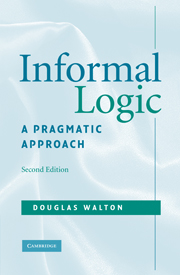Book contents
- Frontmatter
- Contents
- Preface
- Acknowledgments
- Informal Logic
- 1 Argument as reasoned dialogue
- 2 Questions and answers in dialogue
- 3 Criticisms of irrelevance
- 4 Appeals to emotion
- 5 Valid arguments
- 6 Personal attack in argumentation
- 7 Appeals to authority
- 8 Inductive errors, bias, and fallacies
- 9 Natural language argumentation
- Bibliography
- Index
1 - Argument as reasoned dialogue
Published online by Cambridge University Press: 05 June 2012
- Frontmatter
- Contents
- Preface
- Acknowledgments
- Informal Logic
- 1 Argument as reasoned dialogue
- 2 Questions and answers in dialogue
- 3 Criticisms of irrelevance
- 4 Appeals to emotion
- 5 Valid arguments
- 6 Personal attack in argumentation
- 7 Appeals to authority
- 8 Inductive errors, bias, and fallacies
- 9 Natural language argumentation
- Bibliography
- Index
Summary
The goal of this book is to help the reader use critical methods to impartially and reasonably evaluate the strengths and weaknesses of arguments. The many examples of arguments studied in this text are familiar, yet controversial specimens from such sources as political debates, legal arguments, international disputes on foreign policy, scientific controversies, consumer decision-making questions, ethical problems, and health issues. Any argument, including contexts of lively debate, conflict of opinion, reasoned persuasion, questioning, criticism or cross-examination, can be usefully analyzed by the methods that follow.
It is to be emphasized that the methods of this undertaking are essentially practical. They come as much or more under the topic of what is properly called logical pragmatics, as opposed to (semantical) logical theory. Logical theory traditionally has tended to emphasize semantic relationships, that is, relationships between sets of true or false propositions (the subject-matter of chapter 5 in this text). Logical pragmatics has to do with the use of these propositions by an arguer to carry out a goal of dialogue in reasoning with a second participant in the dialogue. One common and important type of goal is to successfully convince or persuade another arguer with whom the first arguer is engaged in reasoned dialogue. In logical theory, an argument is a set of propositions, nothing more or less. And all that matters is the truth or falsehood of these propositions. The wider context of dialogue is not taken into account.
- Type
- Chapter
- Information
- Informal LogicA Pragmatic Approach, pp. 1 - 37Publisher: Cambridge University PressPrint publication year: 2008



